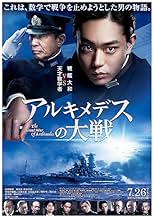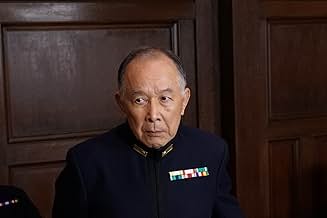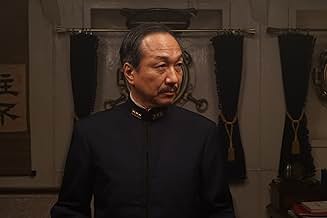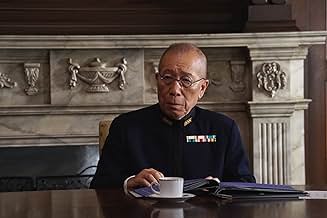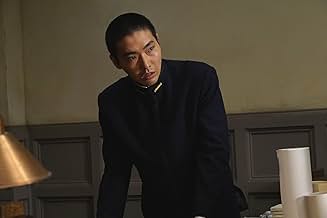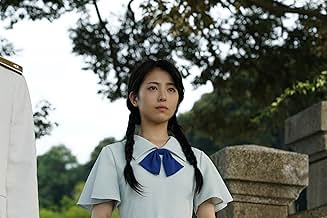IMDb-BEWERTUNG
6,7/10
1303
IHRE BEWERTUNG
1933 deckt ein junger Marineoffizier und Mathe-Wunderkind eine Verschwörung um den Bau japanischer Kriegsschiffe für den laufenden 2. Weltkrieg auf.1933 deckt ein junger Marineoffizier und Mathe-Wunderkind eine Verschwörung um den Bau japanischer Kriegsschiffe für den laufenden 2. Weltkrieg auf.1933 deckt ein junger Marineoffizier und Mathe-Wunderkind eine Verschwörung um den Bau japanischer Kriegsschiffe für den laufenden 2. Weltkrieg auf.
- Regie
- Drehbuch
- Hauptbesetzung
- Auszeichnungen
- 4 Nominierungen insgesamt
T.J. Anthony
- Osami Nagano
- (English version)
- (Synchronisation)
Luis Bermudez
- Mr. Osato
- (English version)
- (Synchronisation)
Jacob Eiseman
- Various Soldiers and Walla
- (English version)
- (Synchronisation)
Alex Hom
- Shojiro Tanaka
- (English version)
- (Synchronisation)
Chase Kloza
- Additional voices
- (English version)
- (Synchronisation)
Lizzy Laurenti
- Walla
- (Synchronisation)
Nicholas Markgraf
- Additional Voices
- (English version)
- (Synchronisation)
- …
Empfohlene Bewertungen
"The Great War of Archimedes" (2019) offers a captivating journey into naval politics and wartime calculations. Though visually impressive, the film's 2+ hour runtime can feel bloated at times, with repetitive sequences and drawn-out dialogues. While the central plot about a math prodigy uncovering corruption is intriguing, the pacing hinders its full impact.
Despite these shortcomings, the film's strength lies in its engaging characters and the compelling moral dilemma presented. Suda Masaki delivers a nuanced performance as the conflicted math whiz, while the supporting cast adds depth and intrigue. The film successfully portrays the complexities of war and the sacrifices demanded from individuals caught in its midst.
Overall, "The Great War of Archimedes" is a worthwhile watch for those interested in historical dramas and intricate plotlines. However, viewers seeking a fast-paced experience might find it a bit long-winded.
Rating: 7/10.
Despite these shortcomings, the film's strength lies in its engaging characters and the compelling moral dilemma presented. Suda Masaki delivers a nuanced performance as the conflicted math whiz, while the supporting cast adds depth and intrigue. The film successfully portrays the complexities of war and the sacrifices demanded from individuals caught in its midst.
Overall, "The Great War of Archimedes" is a worthwhile watch for those interested in historical dramas and intricate plotlines. However, viewers seeking a fast-paced experience might find it a bit long-winded.
Rating: 7/10.
Great Japanese film about the pre-war corruption, code of honor and nationalistic pride that led to Japan's complete destruction. So many in the high command knew a war with America was unwinnable but militaristic pride and honor to the Emperor ruled their decisions.
Largest Battleship ever built used for nothing more than a Kamikaze Raid that took 3000 sailors.
Not an action film (apart from the sinking), but a Japanese snapshot of ne part of mindset that led to war.
Best watched in the original Japanese with subtitles.
*oh, actor who portrayed Admiral Nagumo in Midway plays Admiral Nagano here.*
Largest Battleship ever built used for nothing more than a Kamikaze Raid that took 3000 sailors.
Not an action film (apart from the sinking), but a Japanese snapshot of ne part of mindset that led to war.
Best watched in the original Japanese with subtitles.
*oh, actor who portrayed Admiral Nagumo in Midway plays Admiral Nagano here.*
The Great War of Archimedes is Takashi Yamazaki's second stab at similar themes he would later refine further in the glorious Godzilla Minus One, yet he handles said themes in way more cynical approach than what we saw with the big lizard. With The Great War of Archimedes, Yamazaki explores all the political and personal ramifications of building what would become the Yamato would cause Japan, inevitable war. In a way, it feels extremely derivative of Yamazaki's earlier The Eternal Zero, acting as a self-aware commentary on Japan's militarism and contemporary national ethos. Much of the film is a courtroom drama, but Yamazaki does manage to sneak in a lot of fabulously executed action, he's one of the best Japanese filmmakers when it comes to utilising CG to augment his set pieces. Combine this with some stirring performances from its cast and a gorgeous score by Naoki Sato leaves The Great War of Archimedes as another underseen gem in Yamazaki's extensive filmography.
I watched the Japanese language version of this movie last night and was impressed with the Japanese cast and their performances. I was unaware that an English dub existed until doing a little research today.
After watching the English dub, I was impressed by all of the English dub actors except for one. The most important one. I'm referring to the lead role of Tadashi Kai originally (well) played by Masaki Suda. Suda's performance was both impressive and expressed the realism that should be expected of a lead actor.
However: The English voice actor chosen to portray the character of Tadashi Kai did a huge disservice to the entire tone of the role. While I will give "Derick Snow" exceptionally high marks for his many performances as a dub actor in the wonderful world of Japanese Anime, his portrayal of "Lt. Commander Tadashi Kai was both childish and demeaning. Snow made the lead actor in this movie sound like a pansy. It was actually quite embarrassing. One can only hope that Masaki Suda never hears how he was portrayed by an American actor.
You may say that this is one man's opinion, and you would be correct. However I have made my living using my own voice in the broadcast media industry for more years that I care to count these days. Hate me if you will, but I stand by my words.
Just another voice in the crowd :)
After watching the English dub, I was impressed by all of the English dub actors except for one. The most important one. I'm referring to the lead role of Tadashi Kai originally (well) played by Masaki Suda. Suda's performance was both impressive and expressed the realism that should be expected of a lead actor.
However: The English voice actor chosen to portray the character of Tadashi Kai did a huge disservice to the entire tone of the role. While I will give "Derick Snow" exceptionally high marks for his many performances as a dub actor in the wonderful world of Japanese Anime, his portrayal of "Lt. Commander Tadashi Kai was both childish and demeaning. Snow made the lead actor in this movie sound like a pansy. It was actually quite embarrassing. One can only hope that Masaki Suda never hears how he was portrayed by an American actor.
You may say that this is one man's opinion, and you would be correct. However I have made my living using my own voice in the broadcast media industry for more years that I care to count these days. Hate me if you will, but I stand by my words.
Just another voice in the crowd :)
This movie is an insight into modern Japanese thought and modern Japanese propaganda. It contains ideas and explications about the war of the 1930s and 1940s that put a better face on those disasters, at least for the Japanese viewer. But it does so with a minimum of distortion of the facts, showing respect for a highly literate society. It shows a sophistication that is far above the propaganda that is daily fed to American society.
The blame for getting the country into its impossible situation is deftly removed from the governing personalities of the time and, predictably, the emperor is never mentioned in this war film. It is imperative in Japanese culture that no blame be attributed to him, not even an implicit guilt that could be inferred from its denial.
Mention is made of the mood of the country and the indomitable attitude of the Japanese population, buoyed up as it was at the time by an broken series of successes on the Asian mainland. A grand admiral of the imperial navy grimly allows that the public's enthusiasm cannot be inhibited and that it would inexorably lead to war against the western powers. He points out that Japan is already heavily invested in a war in China. These circumstances, combined with the world's reaction to the aggression in Asia, and Japan's withdrawal from the League of Nations, will force war on the Japanese whether they want it or not.
As an aside, Grand Admiral Yamamoto is credited/blamed for originating the idea of destroying the American fleet at Pearl Harbor.
The story line bases on a plot to sell a plan the government on a plan to build the world's biggest battleship, the Yamato, (a real ship which in fact was built by Japan in the 1930s). There is suspense over the amount of funding this will require and competition for the budget from a faction that wants to build aircraft carriers instead. There is no mention of the violation of treaties in building the over-sized ship.
Enter a handsome, brilliant, young man who will unravel all the plotting with some surprising plot twists along with a slight romantic interest with the daughter of a conniving industrialist. He, Tadashi Kai, (superbly acted by Suda Masaki*) is the vehicle that carries us through the story. He also symbolizes the rebel who takes on the establishment and prevails with his fresh, independent insights. Yet, ingeniously, the establishment itself comes through it without serious damage.
The high-ranking Japanese naval officers are depicted with great dignity and ability, though less honesty, throughout the movie. The story reassures the Japanese audience that Japan's motives in the war were honorable and the disasters largely pressed on the country by outside or otherwise overwhelming forces. Other than that it's a very watchable movie, well done with good acting and a very well written story. There are numerous reasons to watch this excellent movie; I hope I have touched upon the more salient of these.
* These Japanese names are in the Asian order, given name following the family name.
The blame for getting the country into its impossible situation is deftly removed from the governing personalities of the time and, predictably, the emperor is never mentioned in this war film. It is imperative in Japanese culture that no blame be attributed to him, not even an implicit guilt that could be inferred from its denial.
Mention is made of the mood of the country and the indomitable attitude of the Japanese population, buoyed up as it was at the time by an broken series of successes on the Asian mainland. A grand admiral of the imperial navy grimly allows that the public's enthusiasm cannot be inhibited and that it would inexorably lead to war against the western powers. He points out that Japan is already heavily invested in a war in China. These circumstances, combined with the world's reaction to the aggression in Asia, and Japan's withdrawal from the League of Nations, will force war on the Japanese whether they want it or not.
As an aside, Grand Admiral Yamamoto is credited/blamed for originating the idea of destroying the American fleet at Pearl Harbor.
The story line bases on a plot to sell a plan the government on a plan to build the world's biggest battleship, the Yamato, (a real ship which in fact was built by Japan in the 1930s). There is suspense over the amount of funding this will require and competition for the budget from a faction that wants to build aircraft carriers instead. There is no mention of the violation of treaties in building the over-sized ship.
Enter a handsome, brilliant, young man who will unravel all the plotting with some surprising plot twists along with a slight romantic interest with the daughter of a conniving industrialist. He, Tadashi Kai, (superbly acted by Suda Masaki*) is the vehicle that carries us through the story. He also symbolizes the rebel who takes on the establishment and prevails with his fresh, independent insights. Yet, ingeniously, the establishment itself comes through it without serious damage.
The high-ranking Japanese naval officers are depicted with great dignity and ability, though less honesty, throughout the movie. The story reassures the Japanese audience that Japan's motives in the war were honorable and the disasters largely pressed on the country by outside or otherwise overwhelming forces. Other than that it's a very watchable movie, well done with good acting and a very well written story. There are numerous reasons to watch this excellent movie; I hope I have touched upon the more salient of these.
* These Japanese names are in the Asian order, given name following the family name.
Wusstest du schon
- WissenswertesAt about 5:30, the ammunition magazines on the battleship Yamato explode, after which the capsized (inverted) bow of the Yamato rises up from the water into a vertical position before sinking. This mirrors the manner in which the future Space Battleship Yamato is destroyed in Uchû senkan Yamato: Kanketsuhen (1983), which itself was later recreated in the reboot series The Trap on All Sides (2012) (albeit her "destruction" in this case only being a ruse to deceive the enemy).
Top-Auswahl
Melde dich zum Bewerten an und greife auf die Watchlist für personalisierte Empfehlungen zu.
- How long is The Great War of Archimedes?Powered by Alexa
Details
- Erscheinungsdatum
- Herkunftsland
- Offizielle Standorte
- Sprache
- Auch bekannt als
- The Great War of Archimedes
- Produktionsfirmen
- Weitere beteiligte Unternehmen bei IMDbPro anzeigen
Box Office
- Weltweiter Bruttoertrag
- 16.454.674 $
- Laufzeit2 Stunden 10 Minuten
- Farbe
Zu dieser Seite beitragen
Bearbeitung vorschlagen oder fehlenden Inhalt hinzufügen


![Trailer [OV] ansehen](https://m.media-amazon.com/images/M/MV5BZmVlZWNmMmMtYmUxMy00MGQ5LWIyMTMtYTRlY2E1M2M0OWNkXkEyXkFqcGdeQXRyYW5zY29kZS13b3JrZmxvdw@@._V1_QL75_UX500_CR0)
